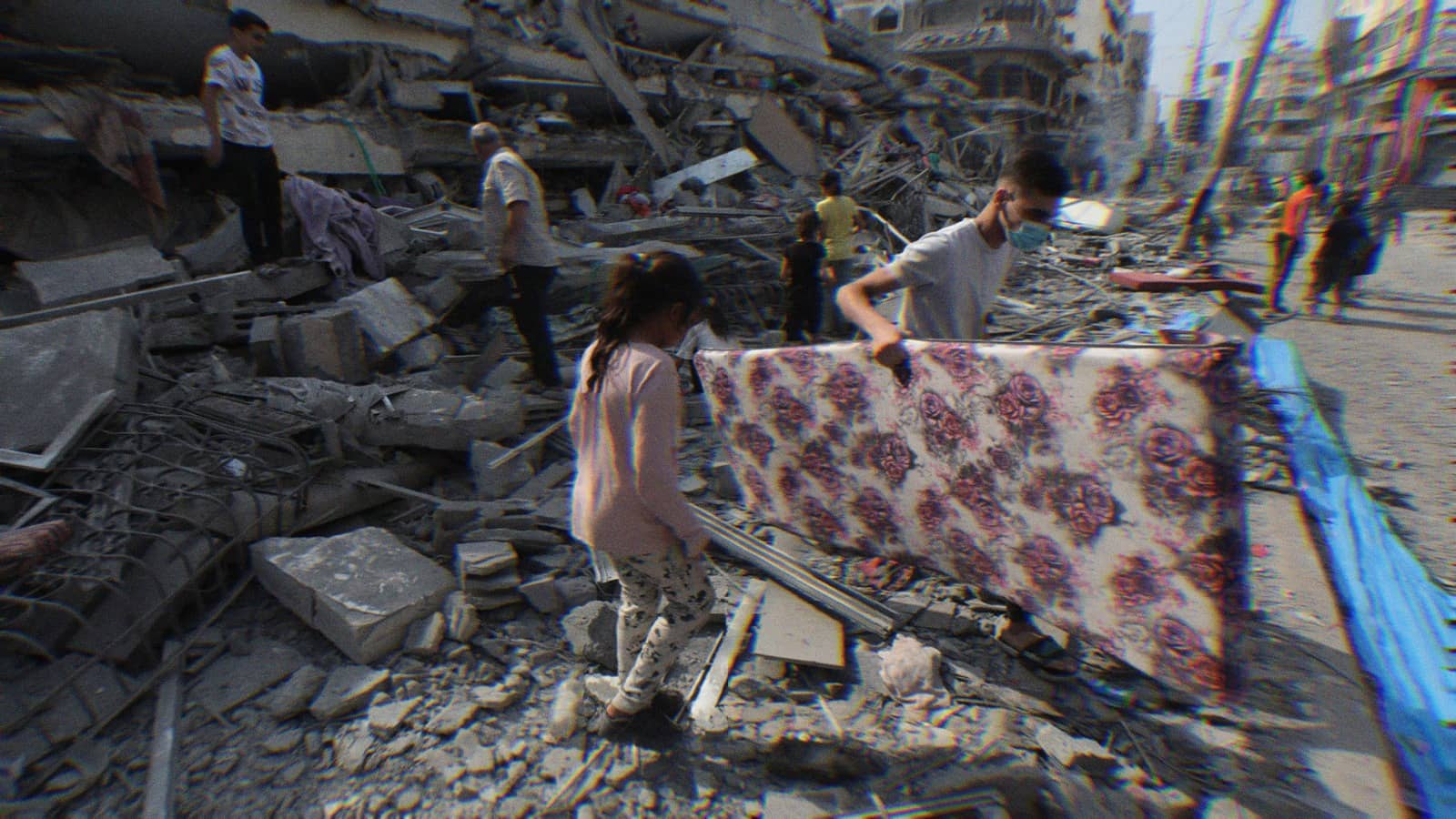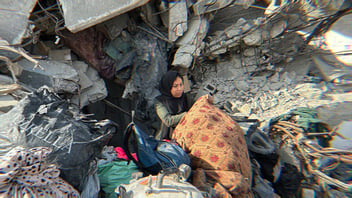‘2 Million Stories in Gaza’
 Image Description: Palestinians inspect the ruins of Aklouk Tower destroyed in Israeli airstrikes in Gaza City on October 2023.
Image Description: Palestinians inspect the ruins of Aklouk Tower destroyed in Israeli airstrikes in Gaza City on October 2023.
Remarkably, we’re approaching a full calendar year since South Africa initiated its genocide case against Israel at the Hague, which resulted in an International Court of Justice (ICJ) panel imposing conditions intended to protect Palestinian life, all of which have gone ignored by Israel and its chief funder and arms dealer, the United States. The case itself will likely take years to play out—all the while Palestinians remain under constant threat, are starved and, in many cases, deprived of medical care amid the destruction of Gaza’s health system.
Speaking of Palestinians in Gaza, Adila Hassim, among South Africa’s representatives at the ICJ, said they’re “killed in their homes, in places where they seek shelter, in hospitals, in schools, in mosques, in churches, and as they try to find food and water for their families.” Little has changed since she made those remarks in early January, except we now have videos of cats eating the littered corpses of killed Palestinians in an area rescuers can’t reach because of Israeli bombings.
A year that began with South Africa’s historic arguments before the ICJ is ending with a series of reports documenting the perilous situation in Gaza, with Amnesty International becoming the largest human rights organization in the world to classify the horrors in the densely populated strip as a genocide.
The nearly 300-page report included more than 200 interviews with people in Gaza and an independent investigation of more than a dozen airstrikes, making it difficult for Israel and its allies to wave it away as the product of uneducated Hamas sympathizers. Amnesty, similar to the ICJ, put the remarks of high-ranking Israeli officials, including Prime Minister Benjamin Netanyahu, at the center of its findings, illustrating that rhetoric matches the destruction on the ground.
Days after it was published, Doctors Without Borders issued its own findings on the critical health situation in Gaza, effectively saying “genocide” is the only logical conclusion at this point:
“Our firsthand observations of the medical and humanitarian catastrophe inflicted on Gaza are consistent with the descriptions provided by an increasing number of legal experts and organisations concluding that genocide is taking place in Gaza. While we don’t have legal authority to establish intentionality, the signs of ethnic cleansing and the ongoing devastation—including mass killings, severe physical and mental health injuries, forced displacement, and impossible conditions of life for Palestinians under siege and bombardment—are undeniable.”
The floodgates, it appears, have officially opened. On Dec. 19, Human Rights Watch (HRW) published a report titled “Extermination and Acts of Genocide.” HRW’s focus was the dire water, sanitation and hygiene situation in Gaza, saying Israel has been deliberately obstructing access to the life-sustaining resource:
“Because of the decimation of the healthcare system in Gaza since October 2023, including disease tracking, the true scale of those harmed or killed by Israeli authorities’ actions that have deprived Palestinians of adequate water is unknown and may likely never be fully understood. However, these policies have likely contributed to thousands of deaths. Doctors and nurses told Human Rights Watch that they had seen numerous infants, children, and adults die from a combination of malnutrition, dehydration, and disease
Despite the voluminous and damning evidence against Israel, little has been done to end the carnage or hold the Netanyahu regime to account.
What impact will the deluge of reports have? Likely infinitesimal if we’re looking for those complicit in genocide, mainly the United States, to protect human life. But as people continue to suffer, it’s critical for anyone with influence—including human rights organizations—to remind us all about the ever-present horrors in Gaza.
To close out the year, the News Beat crew will be releasing an interview with Budour Hassan, an international researcher on Israel and the Occupied Palestinian Territories at Amnesty International.
Hassan addressed a range of topics, including why it took more than a year for groups to issue declarations of genocide while South Africa accumulated enough evidence for such allegations in a matter of months.
“There are growing efforts by human rights organizations to examine what Israel is doing within the framework of genocide,” Hassan told us. “Obviously, each organization has its own way of analysis, its own interpretation. But there is a growing consensus, even among those who don’t say that this is definitely genocide, that what Israel is doing may amount to genocide.”
Or, perhaps, this is all coming at the right time, with people’s awareness about the continued devastation, suffering, and slaughter waning. And if that includes some of us, then the Amnesty report, for one, is worth reading.
Taken together, the newly released investigations and South Africa’s case are evidence of our collective futility in the face of unimaginable war crimes.
When asked what stories will stick with her, Hassan said there are, devastatingly, too many to count.
“The number of stories of human beings that will cling to us forever, the stories that will stay with us for as long as we live, are countless, really,” she said.
Hassan and her colleagues now hold the truths of those they interviewed in their hearts. In the end, stories are all we have. It’s what sustains us. It’s what we’re remembered by. It’s what clarifies our existence, gives life meaning.
“There are two million stories in Gaza,” Hassan said. “Two million stories of horror, of humiliation, of war and somehow, somehow, of unbelievable desire to live.”
These stories demand not just our attention, but our action. While the Biden administration continues to enable this genocide through military aid and diplomatic cover, these two million voices remind us of what’s at stake. Each story is an indictment of those in power, and a call to stand with those fighting for survival. Each one is worth telling.
Listen to the News Beat episode ‘Unspeakable Horror’: Amnesty International Accuses Israel of Genocide in Gaza.
Image Source
- Palestinian News & Information Agency (Wafa) in contract with APAimages, CC BY-SA 3.0, via Wikimedia Commons. Changes were made.
Rashed Mian is the managing editor of the award-winning News Beat podcast and co-founder of the newly launched Free The Press (FTP) Substack newsletter. Throughout his career, he has reported on a wide range of issues, with a particular focus on civil liberties, systemic injustice and U.S. hegemony. You can find Rashed on X @rashedmian and on Bluesky @rashedmian.bsky.social.


